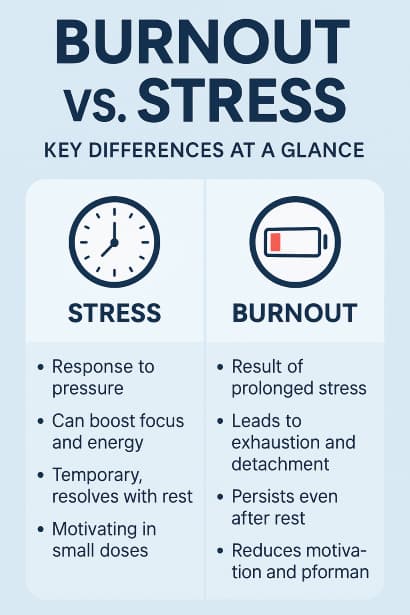In Manhattan, it’s almost expected to be stressed. But knowing the difference between burnout vs stress matters. Many professionals, students, and women balancing multiple roles dismiss their symptoms as “just stress,” when in fact they are experiencing burnout.
Burnout is a clinically recognized condition. It doesn’t vanish after a long weekend or a yoga class. Left unchecked, it can affect memory, motivation, focus, and emotional well-being — and it can chip away at your performance in ways that busy, high-functioning people often try to ignore.
At Dr. Iospa Psychiatry Consulting in Midtown Manhattan, our multidisciplinary team — psychiatrists, psychologists, and neuropsychologists — helps professionals, students, and women navigating life transitions recognize and recover from burnout.
Stress Is Temporary
Stress is your body’s short-term alarm system. Think of it as an internal smoke detector. When you’re preparing for a board presentation, studying for finals, or caring for aging parents, that alarm kicks in.
In the short term, stress can actually be helpful:
For professionals: It sharpens focus before a pitch.
For students: It drives last-minute study sessions.
For women: It sparks action when balancing caregiving with work.
Stress usually fades once the challenge is over. Like a sprint, it’s intense but temporary.
Burnout Is Different
Burnout happens when the stress alarm never shuts off. It drains motivation, clouds memory, and makes life feel flat. Unlike stress, it doesn’t disappear with a weekend off or a quick fix. Burnout is chronic, cumulative, and often requires professional support.
Signs of burnout include:
Constant fatigue, even with sleep
Mental fog in meetings or classes
Irritability or emotional numbness
Loss of interest in work or hobbies

Burnout Symptoms and Cognitive Effects: How Stress Impacts Your Brain
Burnout isn’t random. It builds slowly, especially among high-achievers who rarely give themselves permission to slow down.
Executives: Constant availability and blurred work-life boundaries.
Students: Academic overload, internship pressure, and uncertainty about the future.
Women: Caregiving stress, hormonal changes, and career transitions.
Burnout thrives when demands never cease and recovery time is never available; it isn’t just “feeling tired.” It changes how your brain works:
Memory & Focus: Forgetting details, rereading the same paragraph, losing track mid-meeting.
Executive Function: Difficulty organizing, prioritizing, or making decisions.
Emotion Regulation: Irritability, emotional numbness, or frequent outbursts.
This is why neuropsychologists on our team often test attention, memory, and problem-solving in patients experiencing burnout. We want to understand not just what you feel, but how burnout is affecting your brain.
How to Recognize Burnout in Yourself
Ask yourself:
Do you wake up tired no matter how much you sleep?
Do you feel like you’re moving through your day on autopilot?
Do things you once enjoyed — a project, a class, even time with loved ones — feel meaningless?
Are you snapping at colleagues or family more often?
Do you feel “flat,” not deeply sad but disconnected?
If you’re nodding yes, you may not be “just stressed.” You may be experiencing burnout.
How Our Midtown Team Helps
We take a multidisciplinary approach because burnout isn’t one-dimensional.
Psychiatrists
Evaluate mood, anxiety, and sleep patterns.
Provide medication support when burnout overlaps with depression or anxiety.
Guide treatment for complex cases, especially in professionals balancing demanding roles.
Neuropsychologists
Assess how burnout impacts focus, memory, and executive skills.
Differentiate burnout from ADHD, trauma, or early cognitive decline.
Provide tailored strategies for students and professionals.
Therapists & Psychologists
Work with clients on boundaries, perfectionism, and resilience.
Use evidence-based therapies like CBT, mindfulness, and trauma-informed approaches.
Provide a safe, private space to process challenges — essential for women balancing multiple roles.
Practical Strategies for Recovery
While professional care is key, small daily changes can begin the healing process:
Set boundaries with work and technology.
Prioritize sleep — especially for students and professionals.
Move your body daily.
Break big tasks into smaller ones.
Seek connection instead of isolation.
When to Reach Out
If you’ve caught yourself thinking:
“Why can’t I focus like before?”
“Is this burnout, or is it something else like ADHD or depression?”
“Why do I feel disconnected from things that once mattered?”
…it’s time to seek help.
Get Answers Today
Is It Stress or Burnout?
Stress is temporary. Burnout is deeper. Don’t wait until symptoms take over your work, studies, or home life. If you’re questioning whether it’s stress or burnout, book a consultation with our Midtown Manhattan team today. We’ll help you regain focus, energy, and balance with compassionate, individualized care
Contact Us